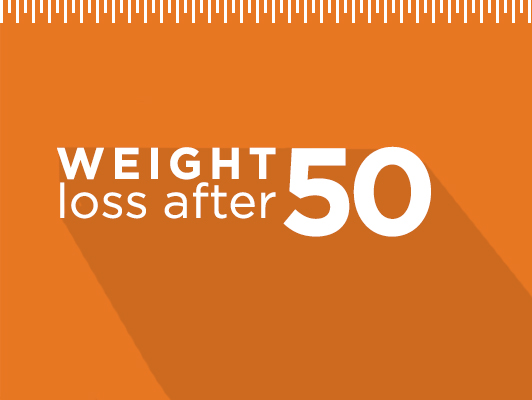Weight Loss after 50

You may have heard that 50 is the new 30, but now that 50 is in your rearview mirror, you are finding that you are not losing weight like you did in your 30s.
As we age, we often lose muscle mass, and if we have less muscle and more fat, our metabolic rate slows. Staying active, eating right, and managing our stress can help us reach our weight loss goals.
Here are a few tips to help with your weight loss goals:
Understand the risks.
Weight that builds under the abdominal wall is hard on your health, as it is correlated with an increased risk of heart disease, high blood pressure, and can lead to diabetes.
Be clear on why you want to lose weight.
Studies find that writing down your goal can increase your chance of success. Use this to create a positive cue and place your goal in a visible spot in your kitchen, closet, or gym shoes!
Talk to your family and friends.
Going out to eat and attending events that include food can be challenging enough, but having tempting foods in your house can be a major barrier. Having a conversation with your family and friends first can reduce the risk of sabotaging your efforts.
Find an exercise routine you enjoy.
Muscle loss can mean a slower metabolism. Embracing weight training exercises, which help build muscle, can help make it more likely for you to lose weight. If you find you would prefer to have something that is easier on your joints, choose water exercises, walking, or low-impact cardiovascular exercises such as yoga, cycling, or kayaking. If you have any questions about doing an exercise properly, ask an athletic professional at your gym. Asking questions can help reduce the risk of injury and help you get the most of your workout. Be sure to first check with your physician before starting any new exercise routine.
Check your diet.
A slower metabolism means looking into what you are eating. To lose weight as we age, we need to eat fewer calories than we did when we were in our 20s or 30s. You can help make small changes in your diet, such as eating a daily breakfast that includes a protein such as Greek yogurt, eggs, or black beans. You can also reduce the amount of calories from added sugar in your diet by reducing desserts or sugar-sweetened beverages, eating fewer fried foods, or eating at restaurants less often.
Spice it up.
Try new foods and recipes, but understand that just because a recipe is healthier does not mean it is calorie-free! Try using quinoa instead of rice or plain Greek yogurt instead of sour cream in your meals.
Keep a healthy attitude.
As we get older, we may find we have more responsibilities both at work and at home. Sleeping more and finding ways to manage stress can help to reduce the risk of indulging in high-calorie foods and can help reduce the risk of other health problems.
Find support.
Having a friend to go to the gym with or someone who will try a new recipe can help with your chances of weight loss. You can also call a health coach to work on weight loss, better nutrition, improving your physical activity routine, or managing stress by calling 1-866-778-6073!
To achieve weight loss in your 50s, every exercise matters and every calorie counts. Creating a lifestyle that can help you work toward your weight loss goal can also help prevent against disease. If you want to know more about how to be successful at social gatherings, the importance of hydration, and meal planning, read about these weight loss 101 tips and more.


